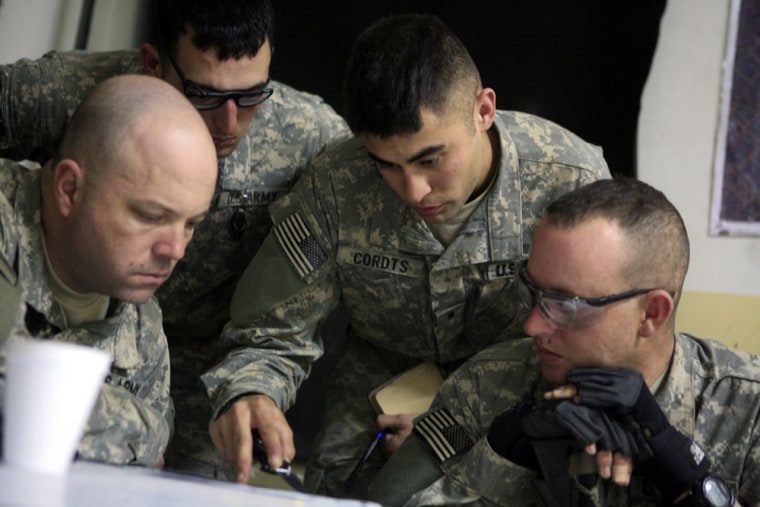U.S. soldiers paced around their new outpost in Sadr City, checking their watches, drinking coffee and waiting for their Iraqi partners.
They finally rolled up more than two hours late.
It was supposed to be a seamless display of Iraqi and American cooperation in the urban fiefdom of Iraq’s most powerful Shiite militia. What it became, however, was a wrangle of competing commanders, bruised egos and conflicting priorities.
The troubles in launching just one joint mission late Tuesday pointed to the larger — and long-term — challenges of trying to mesh battle-hardened U.S. forces with untested Iraqi recruits as Baghdad’s 3-week-old security crackdown tries to hold the ground it’s reclaimed.
“If we get out of here by midnight, I’ll call this a success,” whispered Capt. Josh Taylor, 28, of Florence, Ala., a company commander from the Army’s 1st Squadron, 73rd Cavalry Regiment.
Hours before, U.S. soldiers arrived at a former police station being converted to an Iraqi-U.S. compound. U.S. forces first entered the capital’s sprawling Sadr City district on Sunday under a carefully scripted deal between military authorities and political allies of radical cleric Muqtada al-Sadr and his Mahdi Army militia.
The patrol was scheduled to get under way about 7 p.m. — with one of the first stops to see an informant promising to identify Mahdi Army members in hiding.
But there were no Iraqi forces around except for the handful of local policemen permanently stationed at the outpost.
The nearly 60 Americans went upstairs to wait. The Iraqis stayed in a makeshift lounge, nibbling on bread and cheese and watching the reality show “Pimp My Ride” on a satellite channel.
U.S. soldiers broke out some coffee. Some plugged in their iPods. Taylor and a few others reviewed plans for the mission.
Still no Iraqis. More coffee. More tunes. And more grumbling.
They began to show up about 9 p.m., but the full contingent of about 20 Iraqi troops was not ready until a half hour later.
Negotiations from Iraqi troops
The Iraqis were not prepared to hit the streets just yet, however. There was negotiating ahead.
First up: Who would ride in Humvees and who would walk? Standing on opposite sides of the white plastic table, Iraqi and U.S. commanders hashed it out through interpreters. The agreement: Officers from both sides could ride and lower-ranking soldiers would walk.
Taylor assured the Iraqis the U.S. mission was to teach them how to keep their neighborhoods safe — not to play big brother — and that cooperating was the only way to stop the violence. The Iraqis rolled their eyes and sighed quietly.
A cell phone rang and the Iraqi lieutenant left the room to chat, cutting off Taylor in mid-sentence.
“I would have already smacked him in his face,” Sgt. Chase Decker, 23, of Port Orchard, Wash., muttered from a corner where he and three other U.S. soldiers were watching the culture clash unfold.
After hours of debate, midnight neared and the Iraqi commanders heard a translator explain the operation.
The Iraqis would take the lead. The Americans would follow to observe and help if problems erupted. But it was an Iraqi operation through and through, stressed Taylor.
“Insha’allah,” the Iraqi lieutenant said — or “God willing” in Arabic.
With a note pad, Taylor outlined how close someone could get before the Iraqis could use deadly force on their patrols. He diagrammed how they could best stop traffic — and even where to point their guns when the patrol was moving.
Waiting, waiting, waiting
But the informant was no longer part of the plan. He had long since fallen asleep.
Taylor instructed his men to watch for anything suspicious. He barred them from knocking on doors at the risk of angering anyone sleeping inside.
It’s part of the Pentagon’s soft-touch approach to Sadr City, which they fear could turn from grudgingly accommodating to downright hostile at the slightest provocation.
Taylor and 1st Lt. Eroch Cordts walked to the company’s Humvees, which had been idling for hours.
Streets that just hours ago were buzzing with traffic and pedestrians had grown deserted. The night was quiet except for the hum of floodlights on the outpost.
Cordts, a 24-year-old platoon leader from Burlington, Iowa, pumped a fist into the air.
“Let’s go catch some bad guys,” he screamed.
Taylor sighed and smiled.
“Baby steps, now,” he cautioned both sides. “Baby steps.”
